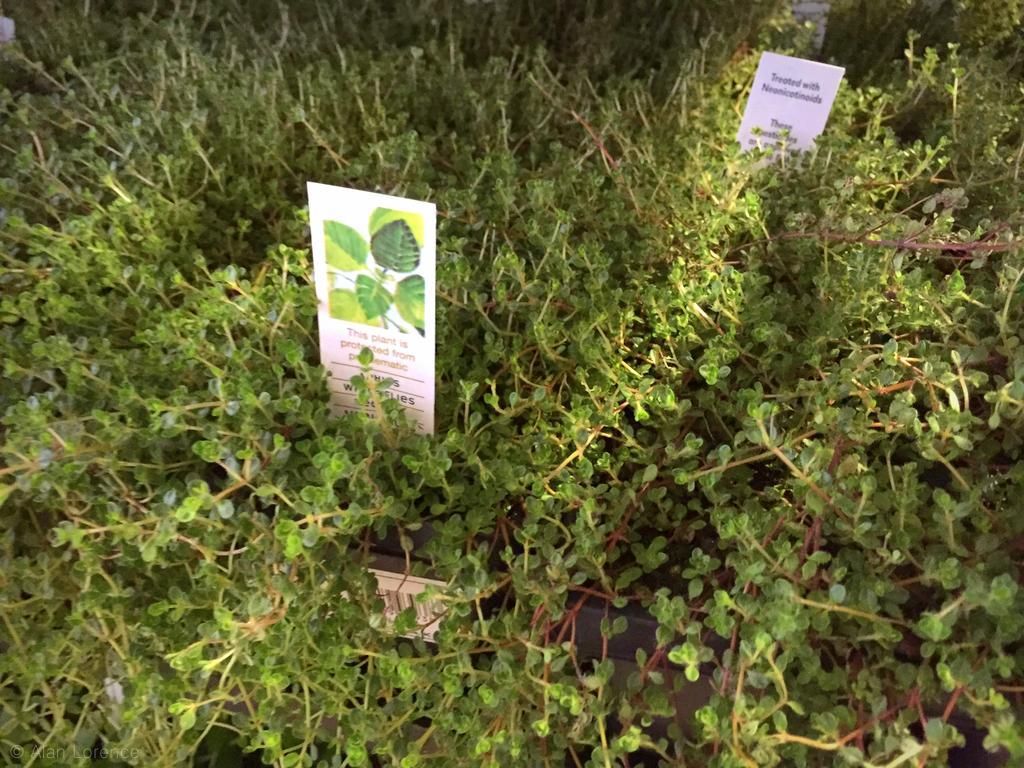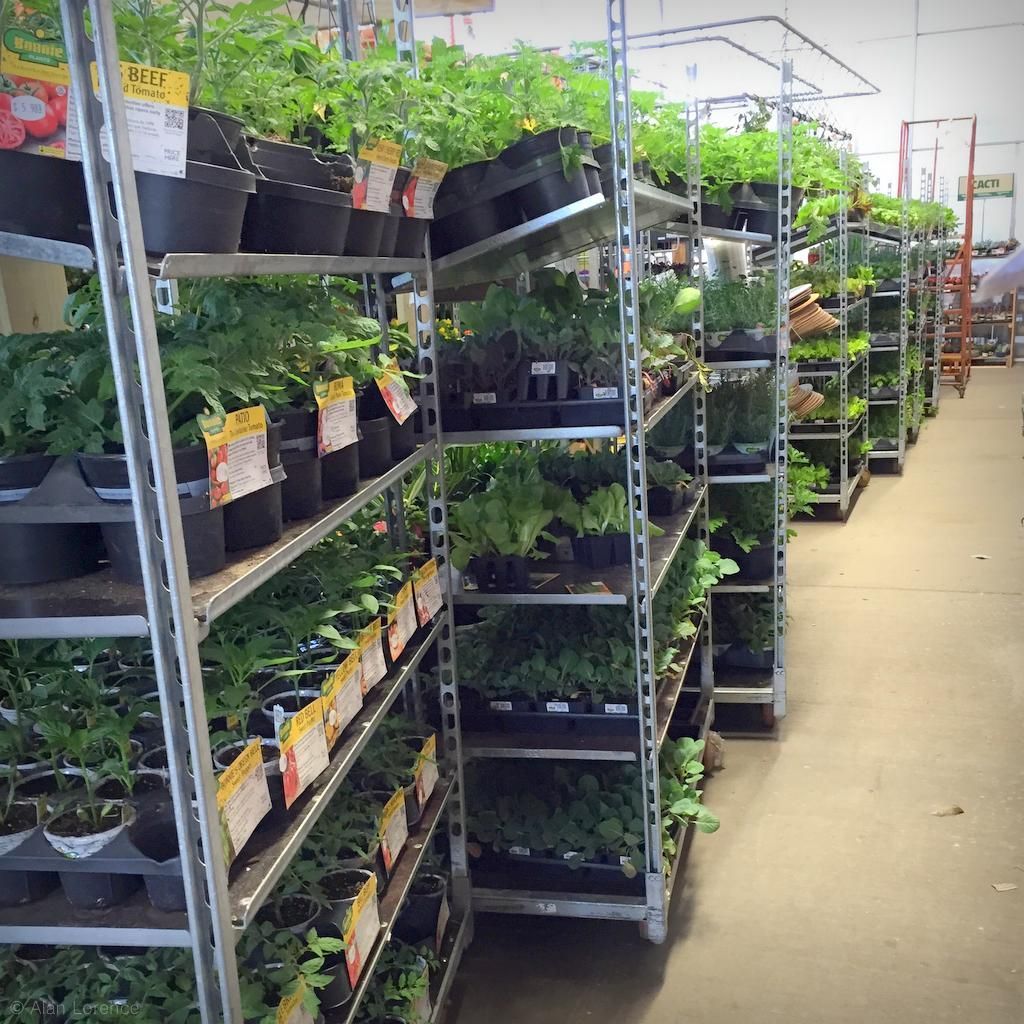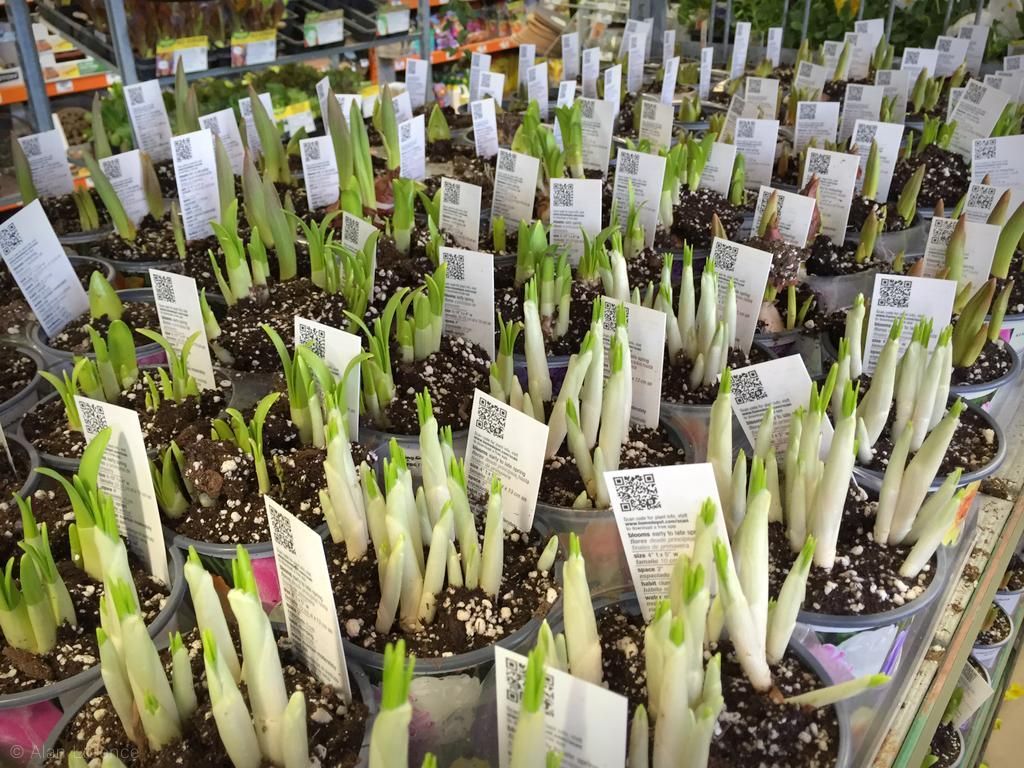It's a start...
>> Monday, March 30, 2015 –
bees
I was at Home Depot this past weekend picking up some supplies for a house repair, and as I always do I took a swing through the garden center just to see what was happening. At this time of year the majority of plants are left on their rolling shipping racks, which allows them to be rolled into the store if the temperatures dip below freezing for a night.
I don't think it actually got that cold Saturday night, but Sunday morning all of the plants were indoors. I'm looking for some groundcover thyme this year, and I've already bought some from a local nursery but was interested in these flats that I saw. Strange that there would be plant tags on these, especially since the tag shows a completely different plant with large leaves.
Taking a closer look...
...the tags don't describe the plant at all ("pink chintz" creeping thyme) but instead note that this plant is "protected"...
If you manage to read all the way to the bottom of the tag though, you'll see the problem word: neonicotinoids. Studies have linked these chemicals to Colony Collapse Disorder in bees, and it has been shown that pollen and nectar from treated plants (and even seeds!) contains the compounds and even a tiny amount will affect bee brains.
From that last link:
Neonicotinoid contamination of the nectar and pollen consumed by bees is around 2.5 parts per billion (around 1 teaspoon in an Olympic swimming pool). There has been wide debate over whether this level is enough to affect the bees. To answer this question, the Dundee-St Andrews team fed bumblebees this low level of neonicotinoid and measured its accumulation at its target site, the bee brain.
At this level, some neonicotinoids were fast acting, shutting down the major site of energy production, the mitochondria, in brain cells. At even lower levels, brain cells become vulnerable to stimulation by the normal neurotransmitter used to transmit information. Under these conditions, brain cells cannot function and bees struggle to learn important life skills, such as recognising that the scent of a flower predicts a food reward, or remembering their way home.
The back of the tag provides more
Okay, so at least they're starting to label that they're using these chemicals so that plant buyers can make more informed choices. To be honest though, I didn't see any signs at the local nursery that said anything about the usage of neonicotinoids, and I didn't ask last visit. (I will next time!)
Checking some other plant racks at Home Depot, I didn't see any of the tags.
The Ranunculus did have them, but the tag was not clearly visible...
...it was pushed all the way down into the soil behind the larger plant tag. Very easy to miss. (I don't know if bees visit Ranunculus because I've never grown them, but bees do visit thyme flowers.)
Other plants didn't seem to have the tags.
I considered picking up some more spring bulbs but were they treated with neonicotinoids? I just don't know. (Plus they were really difficult to shop for on this 6-foot-high shelf!)
So it looks like Home Depot at least is starting to make changes when it comes to neonicotinoids.
The first step is admitting that you have a problem, right?
.











Definitely. And it's their recognition that consumers do look at these things too.
I've seen these tags at H.D. as well and wonder how many people who shop mostly at the box stores will notice anything more than the protected part. A few weeks ago, a whole shipment of citrus plants had these tags. In addition to poisoning the bees, what happens when people consume the fruit? How many years does it take for the plant to be free of the chemical? Scary!
Good questions, Peter. I think it's a great step in the right direction and time will tell - people vote with their wallets. We do, at least I do, look at these things, you did, Alan and are spreading the knowledge. We all need to know about this. This is why I love, for example, Xera plants, they are a grower committed to not using pesticides. Yay! I want to support businesses like them.
The neonics are fighting back with "positive spin" marketing :-/
It's good to know that more people are informed. And i can't imagine the magnitude of plants being sold in depots like that, a lot of gardeners indeed!
I think it's a really good step, especially if the next step is phasing out these hazardous chemicals. But unless laws require proper labeling, consumers still don't really have a choice.